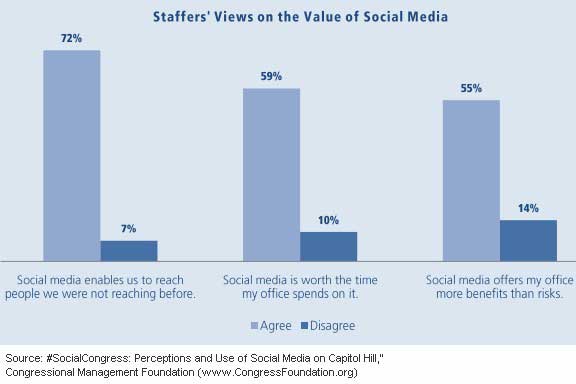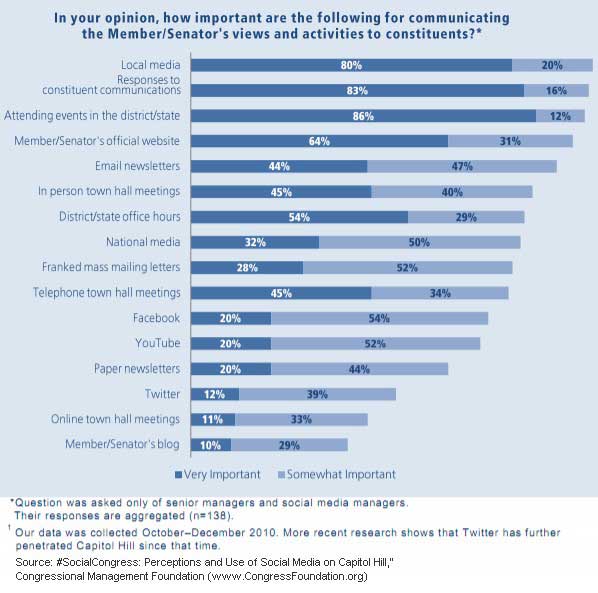Most Members of Congress have integrated social media into their communications strategies—using social tools to gauge public opinion, communicate with constituents, and reach new people, according to a survey from the Congressional Management Foundation (CMF).
Among congressional staffers surveyed, however, Democrats are more likely than Republicans to say their offices do not spend enough time on online communications:
- 41% of Democrats say they don't post enough video content, compared with 27% of Republicans who say the same.
- 37% of Democrats say their offices don't conduct enough email campaigns; 20% of Republicans say the same.
Most of those surveyed say social media is nevertheless providing value to congressional offices:
- 72% of staffers say social media is helping Members communicate with people they were not reaching previously.
- 59% say social media is worth the time invested.
- 55% say social media offers their offices more benefits than risks.

Below, additional findings from the report titled "Perceptions and Use of Social Media on Capitol Hill," based on a survey of 260 staff members of the US Congress and issued by the CMF.
Top Channels for Connecting With Constituents
According to congressional staffers, Facebook is the most important channel, followed by YouTube and Twitter:
- 74% senior managers and social media managers say Facebook is somewhat (54%) or very important (20%) for communicating their Members' views.
- 72% of such staffers say YouTube is somewhat (52%) or very important (20%) for communicating Members' views.
- 51% say Twitter is a somewhat (39%) or very important (12%) vehicle for Members' communications.

Despite the importance of social channels, congressional offices rely heavily on local media, official websites, and email, with 100%, 95%, and 91%, respectively, viewing those channels as somewhat or very important for communicating Members' views.
Understanding Constituents' Views, Opinions
Nearly two-thirds of senior managers and social media managers (64%) say Facebook is a somewhat or very important tool for understanding constituents' views and opinions; 42% say the same about Twitter.
Younger Staffers More Upbeat About Social Media
Younger staffers tend to have more favorable attitudes toward social media communications:
- 66% of the staffers age 30 and younger say social media is worth the time their offices spend on it, compared with 32% of those age 51+ who say the same.
- 63% of staffers age 30 and younger say their offices "can control their message" on social media channels, compared with only 36% of those age 51+ who say they same.
- Staffers age 30 and younger are less likely than their older colleagues (age 51+) to disagree that social media offers more benefits than risks (7% vs. 23%).
Other key findings:
- 68% of social media managers say email and the Internet have made Senators and Representatives more responsive to constituents, compared with 46% of senior managers who say so.
- More than one-third of the staffers surveyed say their offices spend too little time on online town hall meetings (40%), posting videos (37%), posting to their official website (36%), and on their official blog (34%).
About the data: Findings are from a survey of 260 congressional staff conducted between October and December 2010, conducted by the Congressional Management Foundation (CMF).



